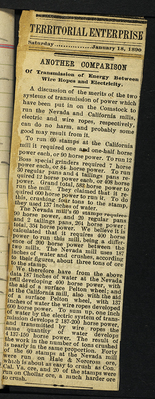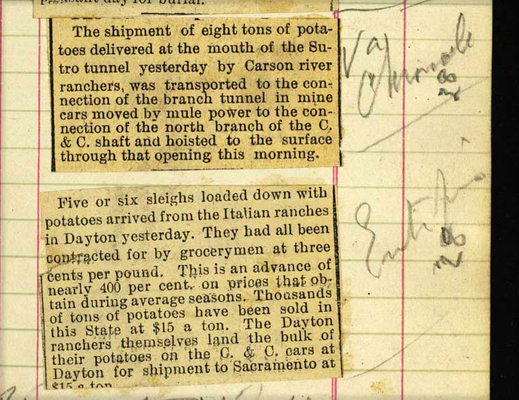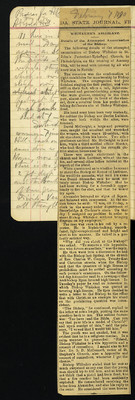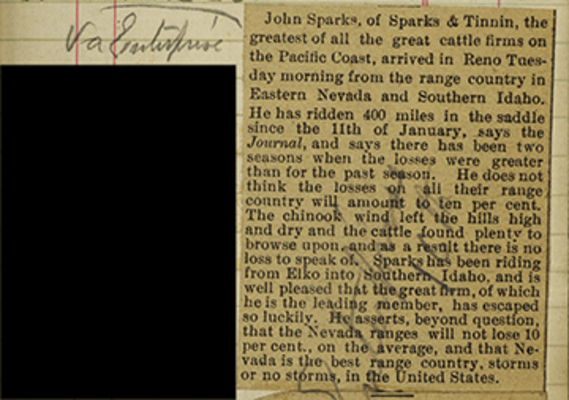Pages
11
TERRITORIAL ENTERPRISE
Saturday January 18, 1890
ANOTHER COMPARISON
Of Transmission of Energy Between Wire Ropes and Electricity.
A discussion of the merits of the two systems of transmission of power which have been put in on the Comstock to run the Nevada and California mills, electric and wire ropes, respectively, can do no harm, and probably some good may result from it.
To run 60 stamps at the California mill it required one and one-half horse power each, or 90 horse power. To run 12 Boss special grinders required 7 horse power each, or 84 horse power. To run 30 regular pans and 4 tailings pans required 12 horse power each, or 408 horse power. Grand total, 582 horse power to run the mill. They claimed that it required 600 horse power to run it. To do this, crushing four tons to the stamp, they used 137 inches of water.
The Nevada mill's 60 stamps requires 90 horse power, and 20 regular pans and 2 tailings pans, 264 horse power; total, 354 horse power. We believe it is calculated that it requires 400 horse power to run this mill, being a difference of 200 horse power between the two mills. The Nevada mill uses 187 inches of water and crushes, according to their figures, about three tons of ore to the stamp.
We therefore have from the above data 187 inches of water at the Nevada mill developing 400 horse power, with the aid of a surface Pelton wheel; and at the California mill, also with the aid of a surface Pelton wheel, with 137 inches of water the wire ropes developed 600 horse power. To sum up, one inch of water by the electric system of transmission develops 2 187-200 horse power, and transmitted by wire ropes the same quantity of water develops 4 137-150 horse power. The result of the work in the number of tons crushed is nearly in the same proportion. Forty of the 60 stamps at the Nevada mill were run on Hale & Norcross ore, which is about as easy to crush as Con. Cal. Va. ore, and 20 of the stamps were run on Chollar ore, a much harder ore to crush.
12
[Va Chronicle 38]
The shipment of eight tons of potatoes delivered at the mouth of the Sutro tunnel yesterday by Carson river ranchers, was transported to the connection of the branch tunnel in mine cars moved by mule power to the connection of the north branch of the C. & C. shaft and hoisted to the surface through that opening this morning.
[Enterprise 28]
Five or six sleighs loaded down with potatoes arrived from the Italian ranches in Dayton yesterday. They had all been contracted for by grocerymen at three cents per pound. This is an advance of nearly 400 per cent, on prices that obtain during average seasons. Thousands of tons of potatoes have been sold in this State at $15 a ton. The Dayton ranchers themselves land the bulk of their potatoes on the C. & C. cars at Dayton for shipment to Sacramento at $15 a ton.
13
[pencil: February 7 1890] ..DA STATE JOURNAL, FR ..
WHITAKER'S ASSAILANT.
Details of the Attempted Assassination of the Bishop.
The following details of the attempted assassination of Bishop Whitaker at St. John's Protestant-Episcopal Church, in Philadelphia, on the evening of January 20th, will be read with interest by all who knew him in Nevada:
The occasion was the confirmation of eight candidates for membership by Bishop Whitaker. The congregation had just finished singing the first psalter, and were still on their feet, when a tall, light-complexioned and genteel-lloking young man, who wore glasses, standing in the front pew, drew a revolver from his pocket and, taking deliberate aim at Bishop Whitaker, fired.
David McCreight, a large and powerfull man, caught the assailant and wrenched the weapon, which was a 22-calibre, with six chambers, from his hands. Two other gentlemen assisted Mr. McCreight to hold him, while a third notified officer Hunter, who took the prisoner to the seventh district station house near by.
There was much excitement in the church and Mrs. Lattimer, wife of the rector, and several other ladies fainted at the report of the pistol.
When questioned as to whether he meant to shoot the Bishop or Rector of Lattimer, the would-be assassin, who said his name was David Alexander, said he most certainly meant Bishop Whitaker; that he had been waiting for a favorable opportunity to fire the shot, and that he would try again.
Alexander betrayed no signs of liquor, and behaved with composure. At the station house he said: "I was, till Friday, a clerk in the money order department of Strawbridge & Clothier's store. On that day I resigned my position in order to shoot Bishop Whitaker without bringing disgrace on my employers."
The man was seen in his cell by a reporter. He is boyish-looking, smooth-faced, light-complexioned and bright and alert in his manner. He talked in a perfectly rational way.
"Why did you shoot at the Bishop?" was asked. "To remove a vile hypocrite. one who favors rumsellers," was the reply,
He then went into a discussion he had with the Bishop last Spring, at the church of Rev. Charles W. Cooper, Twenty-first and Christian streets, when the Bishop said that the question of high license or prohibition must be settled according to each person's conscience. On the following day Alexander read in a newspaper that Archbishop Ryan favored high license. In Tuesday's paper he read an interview in which Bishop Whitaker was quoted as favoring high license. He then decided to write a letter to the Bishop to the effect that with Christ as an example his stand on the prohibition question was inconsistent.
"The Bishop," he continued, replied to the letter at some length, putting the same question back to me. The salient feature was: 'You have read the Bible. Can you say that your life is a model of Christ's?" and upon receipt of this," said the prisoner, "I vowed that I would kill him."
The youth was not excited, but it was evident that he is a religious maniac. In a calm manner he proceeded: "Friend, Bishop Whitaker is a vile hypocrite and a consort of rumsellers. I meant also to kill Rev. Dr. S. D. McConnell, rector of St. Stephen's Church, also a hypocrite and consort of rumsellers, whenever I got the chance."
Bishop Whitaker stated that he was as much surprised as any one that the young man should try to kill him, and at first did not think that a pistol had been fired, but that a fire cracker had been accidently exploded. He remembered receiving the letter from Alexander, and also his reply to the same. He considered the man insane.
14
TERRITORIAL ENTERPRISE
Sunday February 16, 1890
RAILROAD NOTES.
The Impertinently Inquisitive Tourist Takes Notes -- Toothless Trout, Sage-brush Apples and Traveling Opera -- His Conclusions.
Shortly before the recent long-continued snow blockage, two of us were on our return from Reno, seated in the comfortable smoking car of the regular passenger and mail train. On the seat ahead of us was a peculiar looking individual, with small round-top hat, side whiskers, eye glasses and tourist style. Nothing escaped his eye in passing, and he took frequent lead pencil notes in a little book. His ears were evidently as eager as his eyes, for pretty soon he showed the same by frequently, and as we considered impertinently, interrupting our conversation with suhc questions as:
"Excuse me, but what did you say the gentleman's name was that is going to build dams to irrigate with?" "Newlands." Then we saw him note down "Newlands -- dams -- irrigation." Soon he again interrupted us with: "Is that the State Prison, over there, that you speak of? How old did you say those prehistoric tracks are?" About seventeen million years; don't know exactly, but they were there before the prison was built. "Aw, dontcher know, that's a singular circumstance," and we saw him note it down: "State prison -- tracks of the builders -- 17,000,000 years old. "Comstock ore -- Morgan mill -- full blast all the time, did you say?" Yes, yes, its a quartz mill, where they grind the silver out of the rock that comes from the Comstock lode. "But how do they collect the silver?" Oh that's simple enough; they grind the ore to a sort of sandy meal, as it were, and stir it up in a big pan loaded with quicksilver, which catches the silver and the sand washes off. Then they squeeze and roast the quicksilver out and have the pure commercial silver bullion. Down went this into his little book: "Comstock silver meal -- roasted -- commercial bullion."
His annoying interruptions and notes, as well as his inquisitively pecuilar style began to interest us and we didn't mind steamboating him a little. "What's that you say? the trout in the river along here have no teeth?" Certainly not, below the mills, the floured quicksilver in the water salivates them so that their teeth all drop out. "Egad, but that's natural enough." and we say him note down: "Trout in river all salivated -- lose teeth -- become suckers."
"No apples on sagebrush last year, did I hear you say?" None whatever; been getting scarcer every year for some time. Indians have to buy dried apples instead. Down went this in his note book: "Sagebrush apple crop failure -- the poor Indian."
A party of Italian wood-choppers in the forward end of the car were amusing themselves with songs, choruses and a big black bottle. "How was that? An opera troupe?" Oh yes; the railroad company employs them regularly to run over the road for the amusement of the passengers. The we saw him note down, "Worst singers out of h----ll travel this road; also, two of the d----dest liars." Here he pocketed his notebook, for we had arrived at Virginia.
Last week we met him again, on C street. He was just up from Carson, where he had been during the blockade. He knew us right off, and shook hands. "Got short of coal here, did you? How did provisions hold out?" "Very well. Poratoes got scarce, but we soon got a supply from Dayton through the Sutro tunnel and hoisted up the C. & C. shaft.
We slyly glanced over his shoulder, and saw him make the following note in his little book: Only use made of Sutro tunnel is transporting potatoes from Carson river to the Comstock. Met those two infernal champion liars again."
ALF DOTEN
15
[Va Enterprise]
John Sparks, of Sparks & Tinnin, the greatest of all the great cattle firms on the Pacific Coast, arrived in Reno Tuesday morning from the range country in Eastern Nevada and Southern Idaho. He has ridden 400 miles in the saddle since the 11th of January, says the Journal, and says there has been two seasons when the losses were greater than for the past season. He does not think the losses on all their range country will amount to ten per cent. The chinook wind left the hills high and dry and the cattle found plenty to browse upon, and as a result there is no loss to speak of. Sparks has been riding from Elko into Southern Idaho, and is well pleased that the great firm, of which he is the leading member, has escaped so luckily. He asserts, beyond question, that the Nevada ranges will not lose 10 per cent., on the average, and that Nevada is the best range country, storms or no storms, in the United States.






